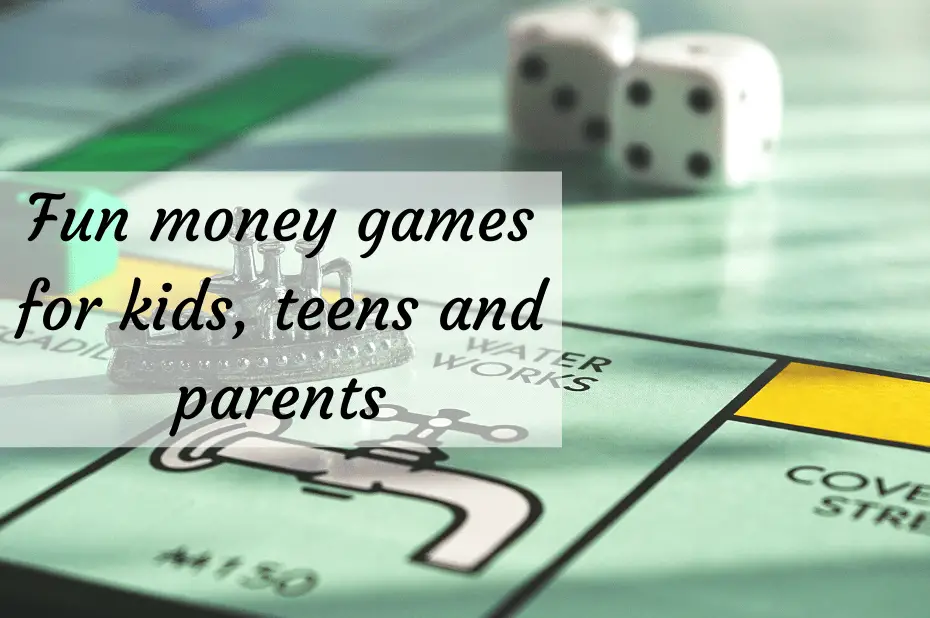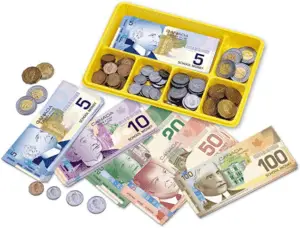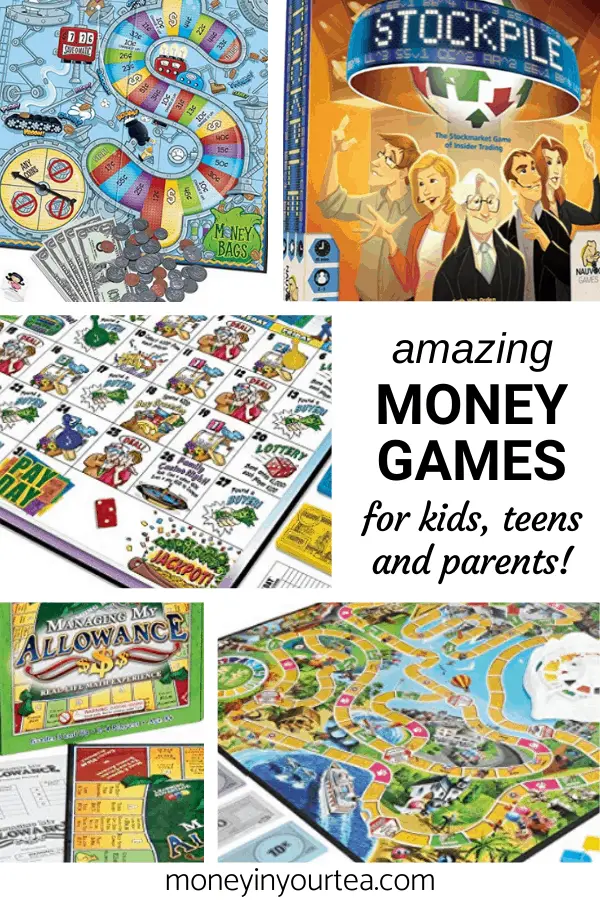The best way to learn anything is hand-on. And games allow us to learn in a really fun way! These are 10 of the most popular and fun money games for kids and teens, that parents will enjoy too. It’s commonly believed that the game of chess was used to teach the strategy and planning skills that would someday be used in military command. Similarly, when we play money and finance related games with our children, they will learn skills needed in their adult lives to budget and invest wisely.
Not only that, but games are a safe place to take risks and see what happens. We can try something, and if it doesn’t work then we might lose the game this time. But we’ve learned for next time to make different choices. In “real life” if we make the wrong money decisions, they can impact our lives for years or even forever.
With four kids, we have played a LOT of games over the years. So let’s have a look at some great money games for children that are also fun for parents!
This post may contain affiliate links, which means I make a small commission if you decide to purchase something through that link. This has no cost to you, and in some cases may give you a discount off the regular price. If you do make a purchase, thank you for supporting my blog! I only recommend products and services that I truly believe in, and all opinions expressed are my own. As an Amazon Associate I earn from qualifying purchases. Please read my disclaimers for more information.
Monopoly
What is the first money game for kids that comes to everyone’s mind? Monopoly, the classic game of buying and trading properties. And since the rights to the game ended several years ago, you can find theme-based Monopoly to suit anyone’s interest. Our family’s version is “Toronto” and it has had a LOT of use over the years.
This game is recommended for ages 8+, though younger players can participate as part of a team with a parent. Alternatively, pick up Monopoly Junior, suitable for ages 5+.
The classic game and all it’s spin-offs use paper money, which is a fantastic way for children to learn about paying for things and making change. Several years ago Monopoly came out with its Ultimate Banking Edition, where the paper money was replaced by a bank card that you tap on the Banking Unit to show your net worth and cash assets.
Traditionalists will say that the classic Monopoly is best. But I can definitely see a role for the Ultimate Banking Edition as a second game. The packaging recommends ages 8+, but I’d hold off on this a bit longer, until your kids have mastered the financial lessons they need from handling paper money. The fact is, electronic banking, debit and credit cards are a way of life, and teens could find new finance lessons from this electronic Ultimate Banking Edition.
The Game of Life
Another classic game of handling paper money is The Game of Life, where having the highest net worth at the end wins.
The game undergoes updates and tweaks over the years, but it’s still essentially the classic you played as a kid. Now you can be a “pet parent” as well as an actual parent as you take the road from high school grad to retirement. It’s a good mix of real life financial decisions – should you go to college and take on debt? – with unexpected expenses cropping up, like a big vet bill.
Recommended for ages 8+.
Payday
Another popular game for families with children 8+ is Payday. With a game board set up like a calendar, you need to plan and budget you way through various expenses until your next payday. Decide ahead of time how many “months” you will play, to make the game longer or shorter.
Earn interest on the balance in your savings account. But beware, if you need to take out a loan the cost is a steep 20%. Buy groceries, fix the car, decide whether to play the lottery. This game packs a lot of real life financial decision-making into each round.
Money Bags
Perfect for younger players, Money Bags will help kids master using coins. The suggested age is 7+, but I think much younger kids would also enjoy this game. The game tests children’s ability to count coins and make change. This is made even more challenging by occasional restrictions such as “25c without using dimes”. Periodically players are required to exchange coins, such as trading 25c in small coins for one quarter.
The game uses simulated American currency, but for the Canadians you can pick up a set of Canadian “school money”. This could have myriad uses for adding into other finance-based games or just for the kids’ imaginary playtime.
Managing my Allowance
While some games impose “adult” expenses such as paying bills, this really is more relatable for the younger crowd. Managing my Allowance gets kids thinking about making purchases for things that matter to them. Players learn about making purchases, sale prices, and calculating change. They save up that allowance and other income from birthday gifts or doing chores, and put that towards a college fund.
The game has two levels of play. In it’s more simple form, the winner has the most saved up in her college fund. While in the full version, financial transactions are recorded and the winner has the biggest college fund plus the most saved from making purchases at sale prices.
This game is recommended for ages 8+.
This would be another great game to substitute in the Canadian currency set shown above.
Pit
Shout out your deal and trade cards to corner the market in cocoa and other commodities in the classic game of Pit. Avoid a bear market, though! While this game is recommended for ages 7+, it might have staying power with teens as they start learning about investing. As a card game, it packs small enough to take on vacations.
Stockpile
This is my top pick for money games for teens. Stockpile is the stock market game of insider trading, geared to ages 13+. It’s the traditional buy-low sell-high strategy of stock market investing. But players are given insider information about how the price of a stock will change by the end of the round. Based on this information, players bid on piles of stocks. “Nobody knows everything about the stock market, but everyone knows something.”
“I really enjoy this game. Don’t let the box fool you, this is a cutthroat game. Manipulate others into selling their assets to make yours more valuable. Force them to spend money on stocks they didn’t want. Surprise them with trading fees. Great game.”
5-star Amazon reviewer
Final Thoughts
There are hundreds of games that teach personal finance skills ranging from basic money counting, to budgeting, or investing. I’ve tried to cover the classics, while also bringing you some ideas of games that might be new to you and your family. If you have a favourite game that teaches money skills, please let me know in the comments!











What a great list Kari. I love the idea of playing games with your kids to teach them financial principles. Some of the games you have suggested are new to me. I will have to check them out.